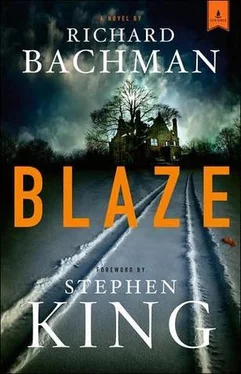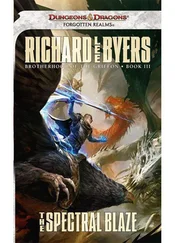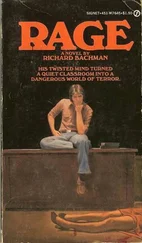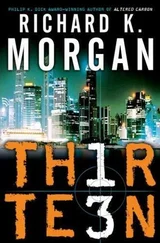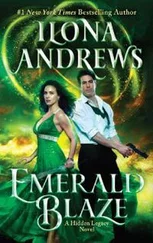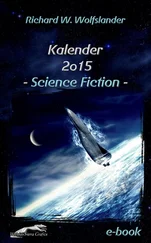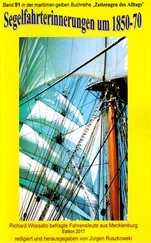Sterling and the two deputies burst through the last clump of trees. “FBI,” Sterling said. “Lay the baby down on the snow and step back.”
Blaze turned to the right and began to run. His breath was hot and hard going down his throat now. He looked for a bird, any bird over the river, and saw none. What he saw was George. George was standing eighty yards or so ahead. He was mostly obscured by blowing snow, but Blaze could see his cap, slewed around to the left — the good-luck side.
“Come on, Blaze! Come on, you fucking slowpoke! Show em your heels! Show em how we roll, goddammit!”
Blaze ran faster. The first bullet took him in the right calf. They were firing low to protect the baby. It didn’t slow him down; he didn’t even feel it. The second hit the back of his knee and blew his kneecap out in a spray of blood and bone fragments. Blaze didn’t feel it. He kept running. Sterling would say later he never would have thought it possible, but the bastard just kept running. Like a gutshot moose.
“ Help me, George! I’m in trouble! ”
George was gone, but Blaze could hear his hoarse, raspy voice — it came to him on the wind. “Yeah, but you’re almost out of it. Shag, baby.”
Blaze let out the last notch. He was gaining on them. He was getting his second wind. He and Joe were going to get away after all. It had been a close shave, but it was all going to turn out okay. He looked at the river, straining his eyes, trying to see George. Or a bird. Just one bird.
The third bullet struck him in the right buttock, angled up, shattered his hip. The slug also shattered. The largest piece hung a left and tore open his large intestine. Blaze staggered, almost fell, then took off running again.
Sterling was down on one knee with his gun in both hands. He sighted quickly, almost off-handedly. The trick was not to let yourself think too much. You had to trust your hand-eye coordination and let it do its work. “Jesus, work Your will,” he said.
The fourth bullet — Sterling’s first — struck Blaze in the lower back, severing his spinal cord. It felt like being punched by a big hand in a boxing glove, just above the kidneys. He went down, and Joe flew from his arms.
“Joe!” he cried, and began to haul himself forward on his elbows. Joe’s eyes were open; he was looking at him.
“He’s going for the kid!” one of the deputies yelled.
Blaze reached for Joe with one large hand. Joe’s own hand, searching for anything, met it. The tiny fingers wrapped around Blaze’s thumb.
Sterling stood behind Blaze, panting. He spoke low, so the deputies couldn’t hear him. “This is for Bruce, sweetheart.”
“George?” Blaze said, and then Sterling pulled the trigger.
Excerpt from a news conference held February 10th:
Q: How’s Joe, Mr. Gerard?
Gerard: The doctors say he’s going to be fine, thank God. It was touch and go there for awhile, but the pneumonia’s gone now. He’s a fighter, no doubt about that.
Q: Any comments about the way the FBI handled the case?
Gerard: You bet. They did a fine job.
Q: What are you and your wife going to do now?
Gerard: We’re going to Disneyland!
[Laughter]
Q: Seriously.
Gerard: I almost was being serious! Once the doctors give Joey a clean bill, we’re going on vacation. Somewhere warm, with beaches. Then, when we’re home, we’re going to work at forgetting this nightmare.
Blaze was buried in South Cumberland, less than ten miles from Hetton House and about the same distance from where his father threw him down a flight of apartment house stairs. Like most paupers in Maine, he was buried on the town. There was no sun that day, and no mourners. Except for the birds. Crows, mostly. Near cemeteries in the country, there are always crows. They came, they sat in the branches, and then flew away to wherever birds go.
Joe Gerard IV lay behind plate glass, in a hospital crib. He was well again. His mother and father would be back this very day to take him home, but he didn’t know it.
He had a new tooth, and knew that; it hurt. He lay on his back and looked at the birds over his crib. They were on wires, and flew whenever a breath of air stirred them into motion. They weren’t moving now, and Joe began to cry.
A face bent over him and a voice began cooing. It was the wrong face, and he began to cry louder.
The face pursed its mouth and blew on the birds. The birds began to fly. Joe stopped crying. He watched the birds. The birds made him laugh. He forgot about wrong faces, and he forgot the pain of his new tooth. He watched the birds fly.
(1973)
Stephen King’s short story “Memory” appeared in Volume 7, Number 4 of Tin House, the Summer 2006 issue. It is the seed from which has grown a much longer tale, Duma Key, which Scribner will publish in early 2008.
Memories are contrary things; if you quit chasing them and turn your back, they often return on their own. That’s what Kamen says. I tell him I never chased the memory of my accident. Some things, I say, are better forgotten.
Maybe, but that doesn’t matter, either. That’s what Kamen says.
My name is Edgar Freemantle. I used to be a big deal in building and construction. This was in Minnesota, in my other life. I was a genuine American-boy success in that life, worked my way up like a motherfucker, and for me, everything worked out. When Minneapolis-St. Paul boomed, The Freemantle Company boomed. When things tightened up, I never tried to force things. But I played my hunches, and most of them played out well. By the time I was fifty, Pam and I were worth about forty million dollars. And what we had together still worked. I looked at other women from time to time but never strayed. At the end of our particular Golden Age, one of our girls was at Brown and the other was teaching in a foreign exchange program. Just before things went wrong, my wife and I were planning to go and visit her.
I had an accident at a job site. That’s what happened. I was in my pickup truck. The right side of my skull was crushed. My ribs were broken. My right hip was shattered. And although I retained sixty per cent of the sight in my right eye (more, on a good day), I lost almost all of my right arm.
I was supposed to lose my life, but I didn’t. Then I was supposed to become one of the Vegetable Simpsons, a Coma Homer, but that didn’t happen, either. I was one confused American when I came around, but the worst of that passed. By the time it did, my wife had passed, too. She’s remarried to a fellow who owns bowling alleys. My older daughter likes him. My younger daughter thinks he’s a yank-off. My wife says she’ll come around.
Maybe sí, maybe no . That’s what Kamen says.
When I say I was confused, I mean that at first I didn’t know who people were, or what had happened, or why I was in such awful pain. I can’t remember the quality and pitch of that pain now. I know it was excruciating, but it’s all pretty academic. Like a picture of a mountain in National Geographic magazine. It wasn’t academic at the time. At the time it was more like climbing a mountain.
Maybe the headache was the worst. It wouldn’t stop. Behind my forehead it was always midnight in the world’s biggest clock-shop. Because my right eye was fucked up, I was seeing the world through a film of blood, and I still hardly knew what the world was. Few things had names. I remember one day when Pam was in the room — I was still in the hospital, this was before the convalescent home — and she was standing by my bed. I knew who she was, but I was extremely pissed that she should be standing when there was the thing you sit in right over in the cornhole.
Читать дальше
